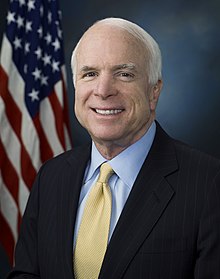| ||
|---|---|---|
|
||
 | ||
John Sidney McCain III (August 29, 1936 – August 25, 2018) was an American politician, statesman and United States Navy officer who served as a United States Senator for Arizona from 1987 until his death in 2018. He previously served two terms in the United States House of Representatives and was the Republican nominee for president of the United States in the 2008 election, which he lost to Barack Obama.
McCain graduated from the United States Naval Academy in 1958 and received a commission in the United States Navy. He became a naval aviator and flew ground-attack aircraft from aircraft carriers. During the Vietnam War, McCain almost died in the 1967 USS Forrestal fire. While on a bombing mission during Operation Rolling Thunder over Hanoi in October 1967, he was shot down, seriously injured, and captured by the North Vietnamese. McCain was a prisoner of war until 1973. He experienced episodes of torture and refused an out-of-sequence early release. During the war, McCain sustained wounds that left him with lifelong physical disabilities. He retired from the Navy as a captain in 1981 and moved to Arizona, where he entered politics.
In 1982, McCain was elected to the United States House of Representatives, where he served two terms. He was elected to the U.S. Senate in 1986, succeeding Arizona native, conservative icon, and the 1964 Republican presidential nominee Barry Goldwater upon Goldwater's retirement as senator from Arizona for 30 years, and McCain easily won reelection five times. While generally adhering to conservative principles, McCain also had a reputation as a "maverick" for his willingness to break from his party on certain issues. His stances on LGBT rights, gun regulations, and campaign finance reform were more moderate than those of the party's base. McCain was investigated and largely exonerated in a political influence scandal of the 1980s as one of the Keating Five; he then made regulating the financing of political campaigns one of his signature concerns, which eventually resulted in passage of the McCain–Feingold Act in 2002. He was also known for his work in the 1990s to restore diplomatic relations with Vietnam. McCain chaired the Senate Commerce Committee from 1997 to 2001 and 2003 to 2005, where he opposed pork barrel spending and earmarks. He belonged to the bipartisan "Gang of 14", which played a key role in alleviating a crisis over judicial nominations.
McCain entered the race for the Republican nomination for president in 2000 but lost a heated primary season contest to Governor George W. Bush of Texas. He secured the Republican presidential nomination in 2008 but lost the general election to Barack Obama. McCain subsequently adopted more orthodox conservative stances and attitudes and largely opposed actions of the Obama administration, especially with regard to foreign policy matters. In 2015, he became Chairman of the Senate Armed Services Committee. He refused to support then-Republican presidential nominee Donald Trump in 2016; McCain won re-election to a sixth and final term that same year. McCain was a vocal critic of the Trump administration. While McCain opposed the Affordable Care Act, he cast the deciding vote against the ACA-repealing American Health Care Act of 2017. After being diagnosed with brain cancer (Glioblastoma) in 2017, he reduced his role in the Senate in order to focus on treatment, and supported the passage of the Tax Cuts and Jobs Act of 2017. He died on August 25, 2018 aged 81. Following his death, McCain lay in state in the Arizona State Capitol rotunda and then in the United States Capitol rotunda. His funeral was televised from the Washington National Cathedral, with the former presidents George W. Bush and Barack Obama giving eulogies.
Last Updated: June 9, 2021

























